Duiker W.J., Spielvogel J.J. The Essential World History. Volume 1: To 1800
Подождите немного. Документ загружается.

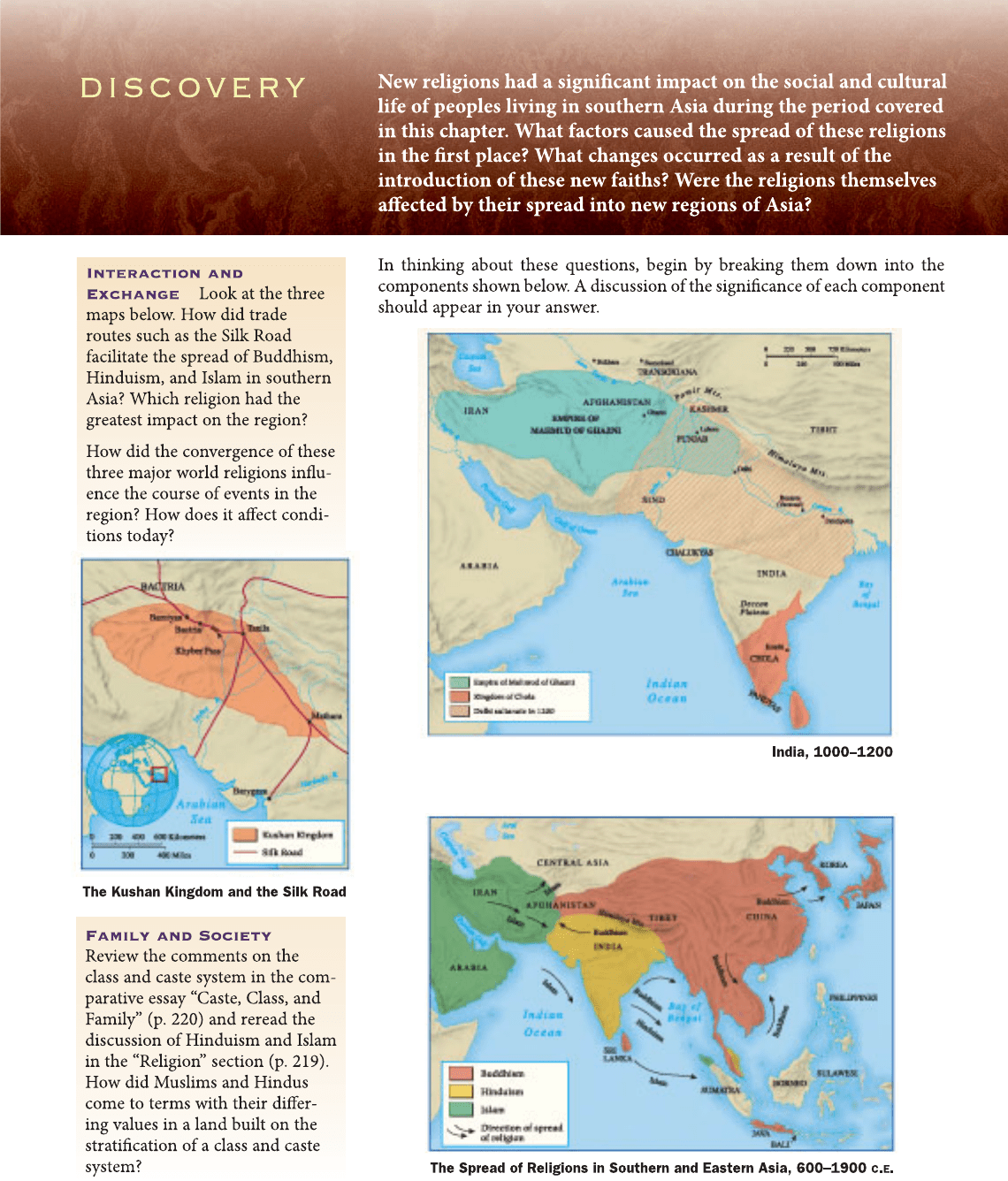
234
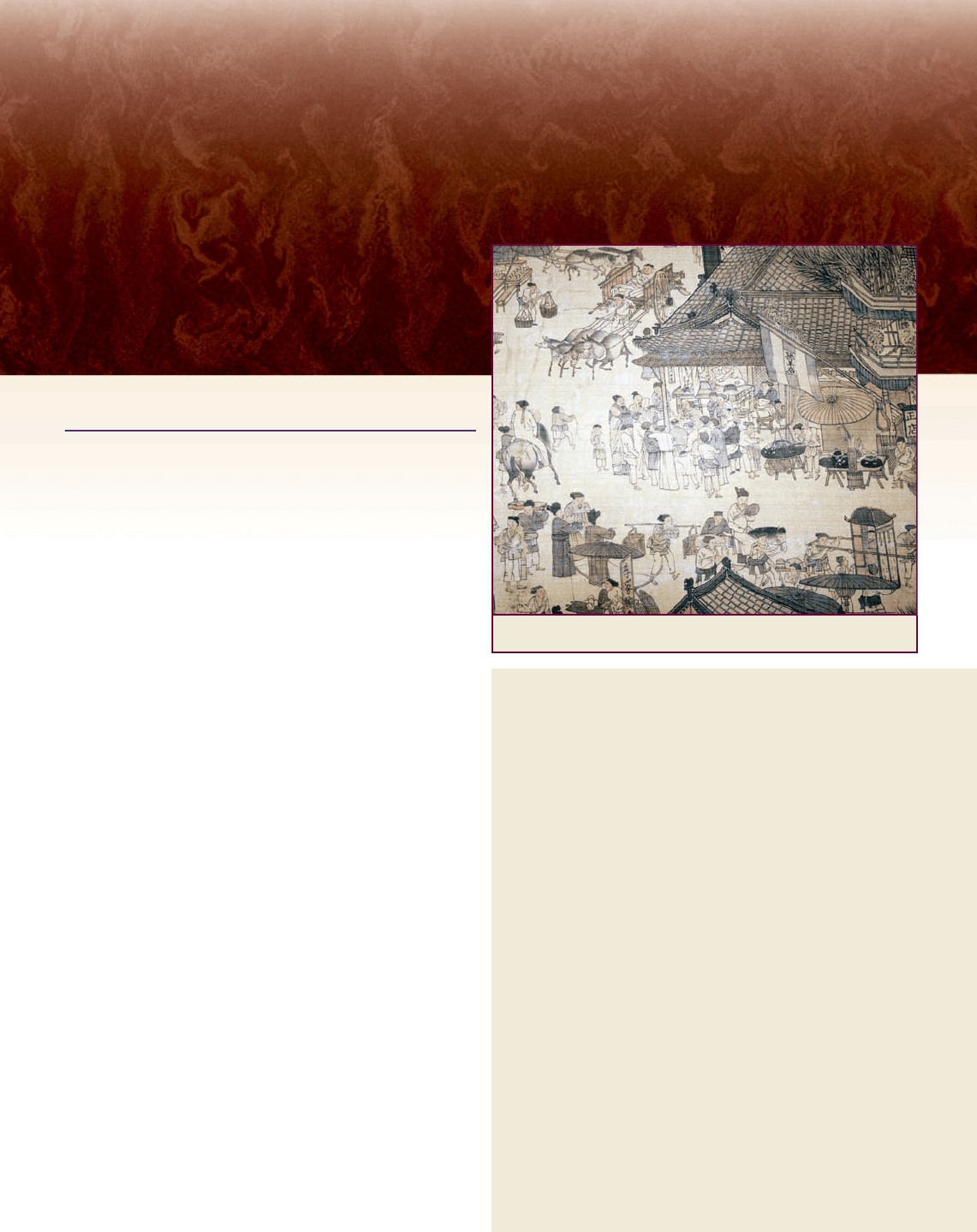
CHAPTER 10
THE FLOWERING OF TRADITIONAL CHINA
CHAPTER OUTLINE
AND FOCUS QUESTIONS
China After the Han
Q
Why did China go through several centuries of internal
division after the decline of the Han dynasty, and what
impact did this have on Chinese society?
China Reunified: The Sui, the Tang, and the Song
Q
What major changes in political structures and social
and economic life occurred during the Sui, Tang, and
Song dynasties?
Explosion in Central Asia: The Mongol Empire
Q
Why were the Mongols able to amass an empire, and
what were the main characteristics of their rule in China?
The Ming Dynasty
Q
What were the chief initiatives taken by the early rulers
of the Ming dynasty to enhance the role of China in the
world? Why did the imperial court order the famous
voyages of Zhenghe, and why were they discontinued?
In Search of the Way
Q
What roles did Buddhism, Daoism, and neo-Confucianism
play in Chinese intellectual life in the period between the
Sui dynasty and the Ming?
The Apogee of Chinese Culture
Q
What were the main achievements in Chinese literature
and art in the period between the Tang dynasty and the
Ming, and what technological innovations and intellec-
tual developments contributed to these achievements?
CRITICAL THINKING
Q
The civilization of ancient China fell under the
onslaught of nomadic invasions, as had some of its
counterparts elsewhere in the world. But China, unlike
other ancient empires, was later able to reconstitute
itself on the same political and cultural foundations.
How do you account for the difference?
Detail of a Chinese scroll, Spring Festival on the River
ON HIS FIRST VISIT to the city, the traveler was mightily
impressed. Its streets were so straight and wide that he could see
through the city from one end to the other. Along the wide boule-
vards were beautiful palaces and inns in great profusion. The city
was laid out in squares like a chessboard, and within each square
were spacious courts and gardens. Truly, said the visitor, this must
be one of the largest and wealthiest cities on earth---a city ‘‘planned
out to a degree of precision and beauty impossible to describe.’’
The visitor was Marco Polo, and the city was Khanbaliq (later
known as Beijing), capital of the Yuan dynasty (1279--1368) and one
of the great urban centers of the Chinese Empire. Marco Polo was
an Italian merchant who had traveled to China in the late thirteenth
century and then served as an official at the court of Khubilai Khan.
In later travels in China, Polo visited a number of other great cities,
including the commercial hub of Kaifeng (Ken-Zan-fu) on the
Yellow River. It is a city, he remarked,
of great commerce, and eminent for its manufactures. Raw silk
is produced in large quantities, and tissues of gold and every
other kind of silk are woven there. At this place likewise they
prepare every article necessary for the equipment of an army.
All species of provisions are in abundance, and to be procured
at a moderate price.’’
1
235
c
Pierre Colombel/CORBIS

China After the Han
Q
Focus Question: Why did China go through several
centuries of internal division after the decline of the
Han dynasty, and what impact did this have on
Chinese society?
After the collapse of the Han dynasty at the beginning of
the third century
C.E., China fell into an extended period
of division and civil war. Taking advantage of the absence
of organized government in China, nomadic forces from
the Gobi Desert penetrated south of the Great Wall and
established their own rule over northern China. In the
Yangtze valley and farther to the south, native Chinese
rule was maintained, but the constant civil war and in-
stability led later historians to refer to the period as the
‘‘era of the six dynasties.’’
The collapse of the Han Empire had a marked effect
on the Chinese psyche. The Confucian principles that
emphasized hard work, the subordination of the indi-
vidual to community interests, and belief in the essen-
tially rational order of the universe came under severe
challenge, and many Chinese intellectuals began to reject
the stuffy moralism and complacency of State Confu-
cianism as they sought emotional satisfaction in he-
donistic pursuits or philosophical Daoism.
Eccentric behavior and a preference for philosophical
Daoism became a common response to a corrupt age. A
group of writers known as the ‘‘seven sages of the bamboo
forest’’ exemplified the period. Among the best known
was the poet Liu Ling, whose odd behavior is described in
this oft-quoted passage:
Liu Ling was an inveterate drinker and indulged himself to
the full. Sometimes he stripped off his c lothes and s at in his
room stark naked. Some men saw him and rebuked him.
Liu Ling said, ‘‘Heaven and eart h are my dwelling, and my
house is my trousers. Why are you all coming into my
trousers?’’
2
But neither popular beliefs in the supernatural nor
philosophical Daoism could satisfy deeper emotional
needs or provide solace in time of sorrow or the hope of
a better life in the hereafter. Instead Buddhism filled
that gap.
Buddhism was brought to China in the first or sec-
ond century
C.E., probably by missionaries and merchants
traveling over the Silk Road. The concept of rebirth was
probably unfamiliar to most Chinese, and the intellectual
hairsplitting that often accompanied discussion of the
Buddha’s message in India was somewhat too esoteric for
Chinese tastes. Still, in the difficult years surrounding the
decline of the Han dynasty, Buddhist ideas, especially
those of the Mahayana school, began to find adherents
among intellectuals and ordinary people alike. As Bud-
dhism increased in popularity, it was frequently attacked
by supporters of Confucianism and Daoism for its foreign
origins. But such sniping did not halt the progress of
Buddhism, and eventually the new faith was assimilated
into Chinese culture, assisted by the efforts of such tireless
advocates as the missionaries Fa Xian and Xuan Zang and
the support of ruling elites in both northern and southern
China (see ‘‘The Rise and Decline of Buddhism and
Daoism’’ later in this chapter).
236 CHAPTER 10 THE FLOWERING OF TRADITIONAL CHINA
Polo’s diary, published after his return to Italy almost twenty years
later, astonished readers with tales of this magnificent but unknown
civilization far to the east.
When Marco Polo arrived, China was ruled by the Mongols, a
nomadic people from Central Asia who had recently assumed con-
trol of the Chinese Empire. The Yuan dynasty, as the Mongol rulers
were called, was only one of a succession of dynasties to rule China
after the collapse of the Han in the third century
C.E. The end of
the Han had led to a period of internal division that lasted nearly
four hundred years and was aggravated by the threat posed by no-
madic peoples from the north. This time of troubles ended in the
early seventh century, when a dynamic new dynasty, the Tang,
came to power.
To this point, Chinese history appeared to be following a pat-
tern similar to that of India, where the passing of the Mauryan
dynasty in the second century
B.C.E. unleashed a period of internal
division that, except for the interval of the Guptas, lasted for several
hundred years. But China did not recapitulate the Indian experi-
ence. The Tang dynasty led China to some of its finest achievements
and was succeeded by the Song, who ruled most of China for nearly
three hundred years. The Song were in turn overthrown by the
Mongols in the late thirteenth century, who then gave way to a
powerful new native dynasty, the Ming, in 1368. Dynasty followed
dynasty, with periods of extraordinary cultural achievement alternat-
ing with periods of internal disorder, but in general, Chinese society
continued to build on the political and cultural foundations of the
Zhou and the Han.
Chinese historians, viewing this vast process as it evolved over
time, began to hypothesize that Chinese history was cyclical, driven
by the dynamic interplay of the forces of good and evil, yang and
yin, growth and decay. Beyond the forces of conflict and change lay
the essential continuity of Chinese history, based on the timeless
principles established by Confucius and other thinkers during the
Zhou dynasty in antiquity. If India often appeared to be a politically
and culturally diverse entity, only sporadically knit together by am-
bitious rulers, China, in the eyes of its historians, was a coherent
civilization struggling to relive the glories of its ancient golden age
while contending against the divisive forces operating throughout
the cosmos.

China Reunified: The Sui,
the Tang, and the Song
Q
Focus Question: What major changes in political
structures and social and economic life occurred
during the Sui, Tang, and Song dynasties?
After nearly four centuries of internal division, China was
unified once again in 581
C.E. when Yang Jian (Yang
Chien), a member of a respected aristocratic family in
northern China, founded a new dynasty, known as the Sui
(581--618). Yang Jian (who is also known by his reign title
of Sui Wendi, or Sui Wen Ti) established his capital at the
historic metropolis of Chang’an and began to extend his
authority throughout the heartland of China.
The Sui Dynasty
Like his predecessors, the new emperor sought to create a
unifying ideology for the state to enhance its efficiency.
But whereas Liu Bang, the founder of the Han dynasty,
had adopted Confucianism as the official doctrine to hold
the empire together, Yang Jian turned to Daoism and
Buddhism. He founded monasteries for both doctrines in
the capital and appointed Buddhist monks to key posi-
tions as political advisers.
Yang Jian was a builder as well as a conqueror, or-
dering the construction of a new canal from the capital
to the confluence of the Wei and Yellow rivers nearly
100 miles to the east. His son, Emperor Sui Yangdi (Sui
Yang Ti), continued the process, and the 1,400-mile-long
Grand Canal, linking the two great rivers of China, the
Yellow and the Yangtze, was completed during his reign.
The new canal facilitated the shipment of grain and other
commodities from the rice-rich southern provinces to the
densely populated north (see the comparative illustration
below). Sui Yangdi also used the canal as an imperial
highway for inspecting his empire and dispatching troops
to troubled provinces.
Despite such efforts to project the majesty of the
imperial personage, the Sui dynasty came to an end im-
mediately after Sui Yangdi’s death. The Sui emperor was a
tyrannical ruler, and his expensive military campaigns
COMPARATIVE
ILLUSTRATION
The Grand Canal. Built over centuries,
the Grand Canal is one of the
engineering wonders of the world and a crucial
conduit for carrying goods between northern and
southern China. After the Song dynasty, when the
region south of the Yangtze River became the
heartland of the empire, the canal was used to carry
rice and other agricultural products to the food-
starved northern provinces. Many of the towns and
cities located along the canal became
famous for their wealth and cultural
achievements. Among the most
renowned was Suzhou, a center for
silk manufacture, which is
sometimes called the ‘‘Venice of
China’’ because of its many canals.
Shown here at the top right is a
classic example of a humpback
bridge crossing an arm of the canal
in downtown Suzhou. The
resemblance to the Bridge of
Marvels in Venice (lower left) seems
more than coincidental.
Q
In what wa ys do you think the
roles that the Grand Canal in China and the city of Venice pla yed in the regional and
global mark etplace might have differed?
c
William J. Duiker
c
William J. Duiker
CHINA REUNIFIED:THE SUI, THE TANG, AND THE SONG 237
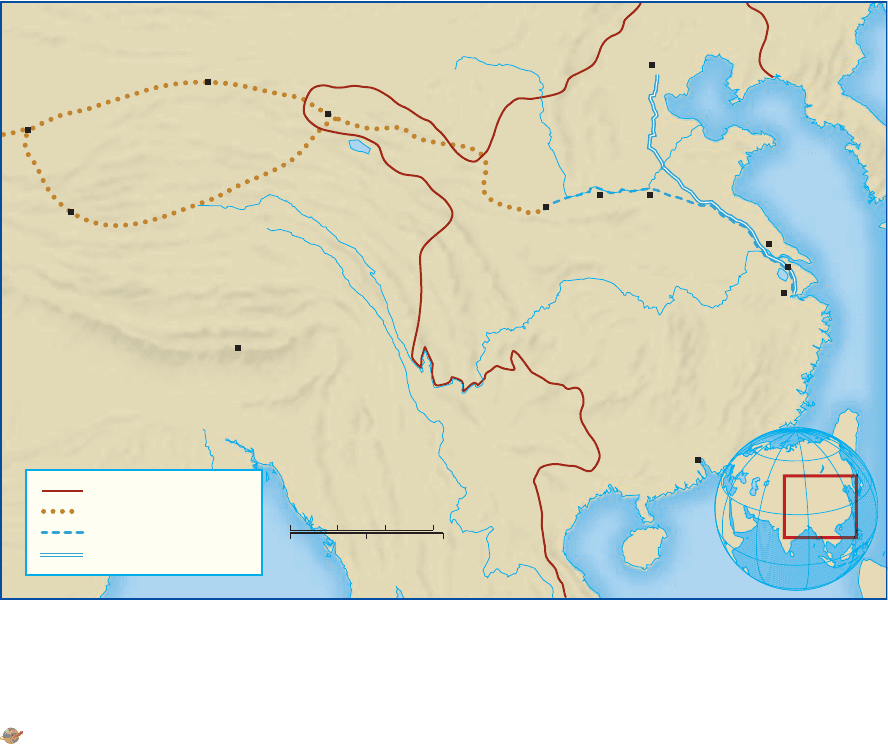
aroused widespread unrest. After his return from a failed
campaign against Korea in 618, the emperor was mur-
dered in his palace. One of his generals, Li Yuan, took
advantage of the instability that ensued and declared the
foundation of a new dynasty, known as the Tang (T’ang).
Building on the successes of its predecessor, the Tang
lasted for three hundred years, until 907.
The Tang Dynasty
Li Yuan ruled for a brief period and then was elbowed
aside by his son, Li Shimin (Li Shih-min), who assumed
the reign title Tang Taizong (T’ang T’ai-tsung). Under his
vigorous leadership, the Tang launched a program of
internal renewal and external expansion that would make
it one of the greatest dynasties in the long history of
China (see Map 10.1). Under the Tang, the northwest was
pacified and given the name of Xinjiang, or ‘‘new region.’’
A long conflict with Tibet led for the first time to the
extension of Chinese control over the vast and desolate
plateau north of the Himalaya Mountains. The southern
provinces below the Yangtze were fully assimilated into
the Chinese Empire, and the imperial court established
commercial and diplomatic relations with the states of
Southeast Asia. With reason, China now claimed to be the
foremost power in East Asia, and the emperor demanded
fealty and tribute from all his fellow rulers beyond the
frontier. Korea accepted tribute status and attempted to
adopt the Chinese model, and the Japanese dispatched
official missions to China to learn more about its customs
and institutions (see Chapter 11).
Finally, the Tang dynasty witnessed a flowering of
Chinese culture. Many modern observers feel that the era
represents the apogee of Chinese creativity in poetry and
sculpture. One reason for this explosion of culture was the
influence of Buddhism, which affected art, literature, and
philosophy, as well as religion and politics. Monasteries
sprang up throughout China, and (as under the Sui)
M
e
k
o
n
g
R
.
Y
a
n
g
t
z
e
R
.
Y
e
l
l
o
w
R
.
Yellow
Sea
South
China Sea
Wei R.
Luoyang
Kaifeng
Beijing
Dunhuang
Lhasa
Jiaohe
Yangzhou
Suzhou
Hangzhou
Chang’an
Canton
G
r
a
n
d
C
a
n
a
l
Kashgar
Khotan
TIBET
XINJIANG
GOBI DESERT
KOREA
TAKLIMAKAN
DESERT
H
i
m
a
l
a
y
a
M
t
s
.
K
u
n
l
u
n
M
t
s
.
H
e
a
v
e
n
l
y
M
t
s
.
0 250 500 750 Kilometers
0 250 500 Miles
China in 700 C.E.
Silk Road
First Grand Canal
Modern Grand Canal
MAP 10.1 China Under the Tang. The era of the Tang dynasty was one of the greatest
periods in the long history of China. Tang influence spread from the Chinese heartland into
neighboring regions, including Central and Southeast Asia.
Q
What was the main function of the Grand Canal during this period, and why was it
built?
View an animated version of this map or related maps at www.c engage.com/history/
duikspiel/essentialworld6e
238 CHAPTER 10 THE FLOWERING OF TRADITIONAL CHINA
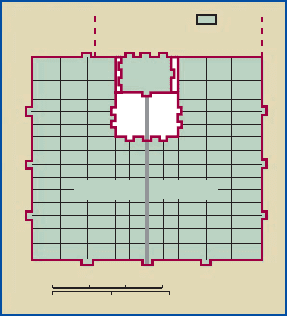
Buddhist monks
served as advisers at
the Tang imperial
court. The city of
Chang’an, now re-
stored to the glory it
had known as the
capital of the Han
dynasty, once again
became the seat of
the empire. It was
possibly the greatest
city in the world of
its time, with an
estima ted popula-
tion of nearly two
million. The city was filled with temples and palaces, and
its markets teemed with goods from all over the known
world.
But the Tang, like the Han, sowed the seeds of their
own destruction. Tang rulers could not prevent the rise of
internal forces that would ultimately weaken the dynasty
and bring it to an end. Two ubiquitous problems were
court intrigues and official corruption. Some historians
have recently speculated that a prolonged drought may
have also played a role in the dynasty’s decline. In 755,
rebellious forces briefly seized control of the capital of
Chang’an. Although the revolt was eventually suppressed,
the Tang never fully recovered from the catastrophe. The
loss of power by the central government led to increased
influence by great landed families inside China and
chronic instability along the northern and western fron-
tiers, where local military commanders ruled virtually
without central government interference. It was an eerie
repetition of the final decades of the Han.
The end finally came in the early tenth century,
when border troubles with northern nomadic peoples
called the Khitan increased, leading to the final collapse
of the dynasty in 907. The Tang had followed the classic
strategy of ‘‘using a barbarian to oppose a barbarian’’
by allying with a trading people called the Uighurs
(a Turkic-speaking people who had taken over many of
the caravan routes along the Silk Road) against their
old rivals. But yet another nomadic people called the
Kirghiz defeated the Uighurs and then turned on the
Tang government in its moment of weakness and
overthrew it.
The Song Dynasty
China slipped once again into chaos. This time, the pe-
riod of foreign invasion and division was much shorter.
In 960, a new dynasty, known as the Song (960--1279),
rose to power. From the start, however, the Song (Sung)
rulers encountered more problems than their prede-
cessors. Although the founding emperor, Song Taizu
(Sung T’ai-tsu), was able to co-opt many of the powerful
military commanders whose rivalry had brought the Tang
dynasty to an end, he was unable to reconquer the
northwestern part of the country from the nomadic
Khitan peoples. The emperor therefore established his
capital farther to the east, at Kaifeng, where the Grand
Canal intersected the Yellow River. Later, when pressures
from the nomads in the north increased, the court was
forced to move the capital even farther south, to Hang-
zhou (Hangchow), on the coast just south of the Yangtze
River delta; the emperors who ruled from Hangzhou are
known as the southern Song. The Song also lost control
over Tibet. Despite its political and military weaknesses,
the dynasty nevertheless ruled during a period of eco-
nomic expansion, prosperity, and cultural achievement
and is therefore considered among the more successful
Chinese dynasties. The population of the empire had
risen to an estimated 40 million people, slightly more
than that of the continent of Europe.
Yet t he Son g dynasty was never able to surmount the
external challe nge from the north, and that failure
eventually brought about the end of the dynasty. During
its final decades, the Song rulers were fo rced to pay
tribu te to the Jurchen peoples from Manchuria. In the
early thirteenth century, the Song, ignoring precedent
and the fate of the Tang, formed an alliance with the
Mongols, a new and obsc ure nomadic pe ople from the
Gobi Desert. As under the Tang, the decision proved to
be a disaster. Within a few years, the Mongols ha d be-
come a much mo re s erious threat to China than the
Jurchen. Afte r defeating the Jurchen, the Mongols
turned their attention to the Song, advancing on Song
terri tory from both the north and the west. By this time,
the Song Empire had been weakened by internal fac-
tionalism and a loss of tax revenues. After a series of
river batt les and sieges marked by the use of catapults
and gunpowder, the Song were defeated, and the con-
querors announced the creation of a new Yuan (Mongol)
dynasty. Ironically, the Mongols had first learned about
gunpowder from the Chinese.
Political Structures:
The Triumph of Confucianism
During the nearly seven hundred years from the Sui to the
end of the Song, a mature politi cal system based on
principles originally established during the Qin and Han
dynasties gradually emerged in China. After the Tang dy-
nasty’s brief flirtation with Buddhism, State Confucianism
Forbidden Park
Palace
City
Imperial
City
Outer City
0 2 4 Miles
0 2 4 6 Kilometers
Chang’an Under the Sui and the
Tang
CHINA REUNIFIED:THE SUI, THE TANG, AND THE SONG 239

became the ideological cement that held the system to-
gether (see the box above). The development of this sys-
tem took several centuries, and it did not reach its height
until the period of the Song dynasty .
Equal Opportunity in China: The Civil Service Exam-
ination
At the apex of the government hierarchy was the
Grand Council, assisted by a secretariat and a chancellery;
it included representatives from all three authorities---civil,
OPPOSING VIEWPOINTS
A
CTION OR INACTION:AN IDEOLOGICAL DISPUTE IN MEDIEVAL CHINA
During the interregnum between the fall of the Han
dynasty in 220
C.E. and the rise of the Tang four
hundred years later, Daoist critics lampooned the
hypocrisy of the ‘‘Confucian gentleman’’ and the
Master’s emphasis on ritual and the maintenance of proper
relations among individuals in society. In the first selection, a
third-century Daoist launches an attack on the type of pompous
and hypocritical Confucian figure who feigns high moral princi-
ples while secretly engaging in corrupt and licentious behavior.
By the eighth century, the tables had turned. Han Yu
(768–824), a key figure in the emergence of neo-Confucian
thought as the official ideology of the state, responded to such
remarks with his own withering analysis of the dangers of ‘‘doing
nothing’’—a clear reference to the famous Daoist doctrine of
‘‘inaction.’’ An excerpt is provided in the second selection.
Biography of a Great Man
What the world calls a gentleman [chun-tzu] is someone is solely
concerned with moral law [fa], and cultivates exclusively the rules
of propriety [li]. His hand holds the emblem of jade [authority]; his
foot follows the straight line of the rule. He likes to think that his
actions set a permanent example; he likes to think that his words
are everlasting models. In his youth, he has a reputation in the
villages of his locality; in his later years, he is well known in the
neighboring districts. Upward, he aspires to the dignity of the
Three Dukes; downward, he does not disdain the post of governor
of the nine provinces.
Have you ever seen the lice that inhabit a pair of trousers?
They jump into the depths of the seams, hiding themselves in the
cotton wadding, and believe they have a pleasant place to live. Walk-
ing, they do not risk going beyond the edge of the seam; moving,
they are careful not to emerge from the trouser leg; and they think
they have kept to the rules of etiquette. But when the trousers are
ironed, the flames invade the hills, the fire spreads, the villages are
set on fire and the towns burned down; then the lice that inhabit
the trousers cannot escape. What difference is there between the
gentleman who lives within a narrow world and the lice that
inhabit trouser legs?
Han Yu, Essentials of the Moral Way
In ancient times men confronted many dangers. But sages arose
who taught them the way to live and to grow together. They served
as rulers and as teachers. They drove out reptiles and wild beasts
and had the people settle the central lands. The people were cold,
and they clothed them; hungry, and they fed them. Because the peo-
ple dwelt in trees and fell to the ground, dwelt in caves and became
ill, the sages built houses for them.
They fashioned crafts so the people could provide themselves
with implements. They made trade to link together those who had
and those who had not and medicine to save them from premature
death. They taught the people to bury and make sacrifices [to the
dead] to enlarge their sense of gratitude and love. They gave rites to
set order and precedence, music to vent melancholy, government to
direct idleness, and punishments to weed out intransigence. When
the people cheated each other, the sages invented tallies and seals,
weights and measures to make them honest. When they attacked
each other, they fashioned walls and towns, armor and weapons for
them to defend themselves. So when dangers came, they prepared
the people; and when calamity arose, they defended the people. But
now the Daoists maintain:
Till the sages are dead,
theft will not end ...
so break the measures, smash the scales,
and the people will not contend.
These are thoughtless remarks indeed, for humankind would have
died out long ago if there had been no sages in antiquity. Men have
neither feathers nor fur, neither scales nor shells to ward off heat
and cold, neither talons nor fangs to fight for food. ...
But now the Daoists advocate ‘‘doing nothing’’ as in high antiq-
uity. Such is akin to criticizing a man who wears furs in winter by
asserting that it is easier to make linen, or akin to criticizing a man
who eats when he is hungry by asserting that it is easier to take a
drink. ...
This being so, what can be done? Block them or nothing will
flow; stop them or nothing will move. Make humans of these peo-
ple, burn their books, make homes of their dwellings, make clear
the way of the former kings to guide them, and ‘‘the widowers, the
widows, the orphans, the childless, and the diseased all shall have
care.’’ This can be done.
Q
How might the author of the first excerpt have responded
to Han Yu’s remarks? Based on the information available to
you, which author appears to make the better case for his
chosen ideological preference?
240 CHAPTER 10 THE FLOWERING OF TRADITIONAL CHINA
military, and censorate. Under the Grand Council was the
Department of State Affairs, composed of ministries re-
sponsible for justice, military affairs, personnel, public
works, revenue, and rites (ritual). This department was in
effect the equivalent of a modern cabinet.
The Tang dynasty adopted the practice of selecting
bureaucrats through civil service examinations. One way
of strengthening the power of the central administration
was to make the civil service examination system the
primary route to an official career. To reduce the power of
the noble families, relatives of individuals serving in the
imperial court, as well as eunuchs, were prohibited from
taking the examinations. But if the Song rulers’ objective
was to make the bureaucracy more subservient to the
court, they may have been disappointed. The rising
professionalism of the bureaucracy, which numbered
about ten thousand in the imperial capital, with an equal
number at the local level, provided it with an esprit de
corps and an influence that sometimes enabled it to resist
the whims of individual emperors.
Under the Song, the examination system attained the
form that it would retain in later centuries. In general,
three levels of examinations were administered. The first
was a qualifying examination given annually at the pro-
vincial capital. Candidates who succeeded in this first
stage were considered qualified but normally were not
given positions in the bureaucracy except at the local
level. Many stopped at this level and accepted positions as
village teachers to train other candidates. Candidates who
wished to go on could take a second examination given at
the capital every three years. Successful candidates could
apply for an official position. Some went on to take the
final examination, which was given in the imperial palace
once every three years. Those who passed were eligible for
high positions in the central bureaucracy or for ap-
pointments as district magistrates.
By Song times, examinations were based entirely on
the Confucian classics. Candidates were expected to
memorize passages and to be able to explain the moral
lessons they contained. The system guaranteed that suc-
cessful candidates---and therefore officials---would have
received a full dose of Confucian political and social
ethics. Many students complained about the rigors of
memorization and the irrelevance of the process. Others
brought crib notes into the examination hall (one en-
terprising candidate concealed an entire Confucian text in
the lining of his cloak).
The Song authorities ignored such criticisms, but they
did open the system to more people b y allowing all males
exc ept criminals or members of cert ain restricted occupa-
tions to take the examinations. To provide potential can-
didates with schooling, training academies were set up at
the provincial and district level. Without such academies,
only individuals fortunate enough to receive training in
the classics in family-run schools would have had the ex-
pertis e to pass the examinatio ns. In time, the majority of
candidates came from the landed gentry , nonaristocratic
landowners who controlled much of the wealth in the
countryside. Because the gentry prized education and be-
came the prim ary up holders of the Confucian tradition,
they were often called the scholar-gentry.
But certain aspects of the system still prevented it
from truly providing equal opportunity to all. In the first
place, only males were eligible. Then again, the Song did
not attempt to establish a system of universal elementary
education. In practice, only those who had been given a
basic education in the classics at home were able to enter
the state-run academies and compete for a position in the
bureaucracy. Unless they were fortunate enough to have a
wealthy relative willing to serve as a sponsor, the poor had
little chance.
Nor could the system guarantee an honest, efficient
bureaucracy. Official arrogance, bureaucratic infighting,
corruption, and legalistic interpretations of government
regulations were as prevalent in medieval China as in
bureaucracies the world over. Nepotism was a particular
problem, since many Chinese, following Confucius, held
that filial duty transcended loyalty to the community.
Despite such weaknesses, the civil service examina-
tion system was an impressive achievement for its day and
probably provided a more efficient government and more
opportunity for upward mobility than were found in any
other civilization of the time. Most Western governments,
for example, did not begin to recruit officials on the basis
of merit until the nineteenth century. Furthermore, by
regulating the content of the examinations, the system
helped provide China with a cultural uniformity lacking
in empires elsewhere in Asia.
Local Government The Song dynasty maintained the
local government in stitution s that it had inherited from
its predecessors. At the base of the government pyramid
was the district (or county), governed by a magistrate.
The mag istrate, assisted by his staff of three or four
officials and several other menial employees, was re-
sponsi ble for ma intaining law and order a nd colle cting
taxes within his jurisdiction. A district could exceed
100,0 00 people. Below the district was the basic unit of
Chinese government , the village. Because villages w ere
so numerous in China, the central government did not
appoi nt an official at that level and allowed the villages
to administer themselves. Village government was nor-
mally in the hands of a council of elders, usually assisted
by a chief. Th e council, usually made up of the heads of
influ ential families in the village, maintained the local
irrigation and transportation network, adjudicated local
CHINA REUNIFIED:THE SUI, THE TANG, AND THE SONG 241
disputes, organized and maintained a mi litia, and as-
sisted in collecting taxes (usually paid in grai n) and
delivering them to the district magistrate.
The Economy
During the long period between the Sui and the Song, the
Chinese economy, like the government, grew considerably
in size and complexity. China was still an agricultural
society, but major changes were taking place within the
economy and the social structure. The urban sector of the
economy was becoming increasingly important, new so-
cial classes were beginning to appear, and the economic
focus of the empire was beginning to shift from the Yellow
River valley in the north to the Yangtze River valley in the
center---a process that was encouraged both by the ex-
pansion of cultivation in the Yangtze delta and by the
control exerted over the north by nomadic peoples during
the Song.
Land Reform The economic revival began shortly after
the rise of the Tang. During the long period of internal
division, land had become concentrated in the hands of
aristocratic families, with most peasants reduced to serf-
dom or slavery. The early Tang tried to reduce the power
of the landed nobility and maximize tax revenues by
adopting the ancient ‘‘equal field’’ system, in which land
was allocated to farmers for life in return for an annual
tax payment and three weeks of conscript labor.
At first, the new system was vigorously enforced and
led to increased rural prosperity and government revenue.
But eventually, the rich and the politically influential
learned to manipulate the system for their own benefit
and accumulated huge tracts of land. The growing pop-
ulation, caused by a rise in food production and the ex-
tended period of social stability, also put steady pressure
on the system. Finally, the government abandoned the
effort to equalize landholdings and returned the land to
private hands while attempting to prevent inequalities
through the tax system. The failure to resolve the land
problem contributed to the fall of the Tang dynasty in the
early tenth century.
The Song tried to resolve the land problem by re-
turning to the successful programs of the early Tang and
reducing the power of the wealthy landed aristocrats.
During the late eleventh century, the reformist official
Wang Anshi (Wang An-shih) attempted to limit the size
of landholdings through progressive land taxes and pro-
vided cheap credit to poor farmers to help them avoid
bankruptcy. His reforms met with some success, but other
developments probably contributed more to the general
agricultural prosperity under the Song. These included
the opening of new lands in the Yangtze River valley,
improvements in irrigation techniques such as the chain
pump (a circular chain of square pallets on a treadmill
that enabled farmers to lift considerable amounts of water
or mud to a higher level), and the introduction of a new
strain of quick-growing rice from Southeast Asia, which
permitted farmers in warmer regions to plant and harvest
two crops each year.
The Urban Economy Major changes also took place in
the Chinese urban economy, which witnessed a signifi-
cant increase in trade and manufacturing. Despite the
restrictive policies of the state, the urban sector grew
steadily larger and more complex, helped by several new
technological developments (see the comparative essay
‘‘The Spread of Technology’’ on p. 243). During the Tang,
the Chinese mastered the art of manufacturing steel by
mixing cast iron and wrought iron. The blast furnace was
heated to a high temperature by burning coal, which had
been used as a fuel in China from about the fourth
century
C.E. The resulting product was used in the man-
ufacture of swords, sickles, and even suits of armor. By
the eleventh century, more than 35,000 tons of steel were
being produced annually. The introduction of cotton
offered new opportunities in textile manufacturing.
Gunpowder was invented by the Chinese during the Tang
dynasty and used primarily for explosives and a primitive
form of flamethrower; it reached the West via the Arabs
in the twelfth century.
The Silk Road The nature of trade was also changing.
In the past, most long-distance trade had been under-
taken by state monopoly. By the time of the Song, private
commerce was being actively encouraged, and many
merchants engaged in shipping as well as in wholesale and
retail trade. Guilds began to appear, along with a new
money economy. Paper currency began to be used in the
eighth and ninth centuries. Credit (at first called ‘‘flying
money’’) also made its first appearance during the Tang.
With the increased circulation of paper money, banking
began to develop as merchants found that strings of
copper coins were too cumbersome for their increasingly
complex operations. Equally useful, if more prosaic, was
the invention of the abacus, an early form of calculator
that simplified the calculations needed for commercial
transactions.
Long-distance trade, both overland and by sea,
expanded under the Tang and the Song . Trade w ith
countries and peoples to the west had been carried on
for centuries (see Chapter 5), but it had declined dra-
matically between the four th and sixth centuries
C.E.as
a result of the collapse of the Han and Roman Empires.
ItbegantorevivewiththeriseoftheTangandthe
simultaneous unification of much of the Middle East
242 CHAPTER 10 THE FLOWERING OF TRADITIONAL CHINA
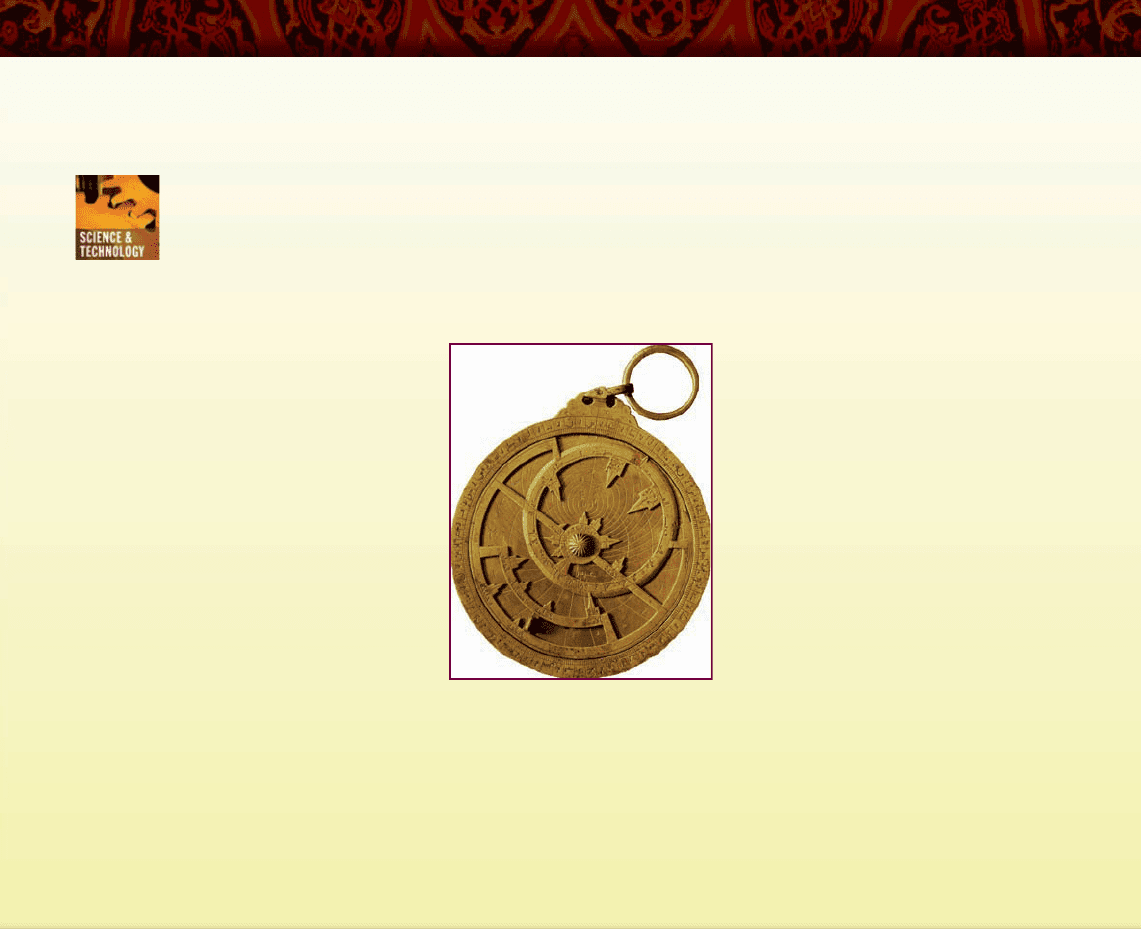
under the Arabs. During the Tang era, the Silk Road
revived and then reached its zenith. Much of the t rade
was carried by the Turkic-speaking Uighurs. During the
Tang, Uighur caravans of two-humped Bactrian camels
(a hardy variety native to Iran and regions to the
northeast) carried goods back and forth between
China and the countries of South Asia and the Middle
East.
In actuality, the Silk Road was composed of a
number of separate routes. The first to be used, probably
because of the jade found in the mountains south of
Khotan, ran along the southern rim of the Taklimakan
Desert via Kashgar and thence through the Pamir
Mountains into Bactria. Eventually, however, this area
began to dry up, and traders were forced to seek other
routes. From a climatic standpoint, the best route for the
Silk Road was to the north of the Tian Shan (Heavenly
Mountains), where moisture-laden northwesterly winds
created pastures where animals could graze. But the area
was frequently infested by bandits who preyed on unwary
travelers. Most caravans therefore followed the southern
route, which passed along the northern fringes of the
Taklimakan Desert to Kashgar and down into north-
western India. Travelers avoided the direct route through
the desert (in the Uighur language, the name means ‘‘go
in and you won’t come out’’) and trudged from oasis to
oasis along the southern slopes of the Tian Shan. The
oases were created by the water runoff from winter snows
in the mountains, which then dried up in the searing heat
of the desert.
COMPARATIVE ESSAY
T
HE SPREAD OF TECHNOLOGY
From the invention of stone tools and the discovery
of fire to the introduction of agriculture and the
writing system, mastery of technology has been a
driving force in the history of human evolution. But
why do some human societies appear to be much more ad-
vanced in their use of technology than others? People living on
the island of New Guinea, for example, began
cultivating local crops like taro and bananas
as early as ten thousand years ago but never
took the next steps toward creating a complex
society until the arrival of Europeans many
millennia later. Advanced societies began to
emerge in the Western Hemisphere during the
ancient era, but none discovered the use of
the wheel or the smelting of metals for tool-
making. Writing also remained in its infancy
there.
Technological advances appear to take place for
two reasons: need and opportunity. Farming peo-
ples throughout the world needed to control the
flow of water, so in areas where water was scarce
or unevenly distributed, they learned to practice
irrigation to make resources available throughout
the region. Sometimes, however, opportunity strikes by accident
(as in the legendary story of the Chinese princess who dropped a
silkworm cocoon into her cup of hot tea, thus opening a series of
discoveries that resulted in the manufacture of silk) or when new
technology is introduced from a neighboring region (as when the
discovery of tin in Anatolia launched the Bronze Age throughout
the Middle East).
The most important factor enabling societies to keep abreast of
the latest advances in technology, it would appear, is participation in
the global trade and communications network. In this respect, the
Abbasid Empire enjoyed a major advantage because the relative ease
of communications between the Mediterranean region and the
Indus River valley gave the empire rapid access to all the resources
and technological advances in that part of
the world. China was more isolated from
such developments because of distance and
barriers such as the Himalaya Mountains.
But with its size and high level of cultural
achievement, China was almost a continent
in itself and was soon communicating with
countries to the west via the Silk Road.
Societies that were not linked to this
vast network were at an enormous disadvan-
tage in keeping up with new developments in
technology. The peoples of New Guinea, at
the far end of the Indonesian archipelago,
had little or no contact with the outside
world. In the Western Hemisphere, a trade
network did begin to take shape between so-
cieties in the Andes and their counterparts in
Mesoamerica. But because of difficulties in
communication (see Chapter 6), contacts were intermittent. As a
result, technological developments taking place in distant Eurasia
did not reach the Americas until the arrival of the conquistadors.
Q
In what ways did China contribute to the spread of technol-
ogy and ideas throughout the world during this period of history?
How did China benefit from the process?
A copper astrolabe from the Middle East,
c. the ninth century
Bibliotheque Nationale de Cartes at Plans/ The Bridgeman Art Library
CHINA REUNIFIED:THE SUI, THE TANG, AND THE SONG 243
